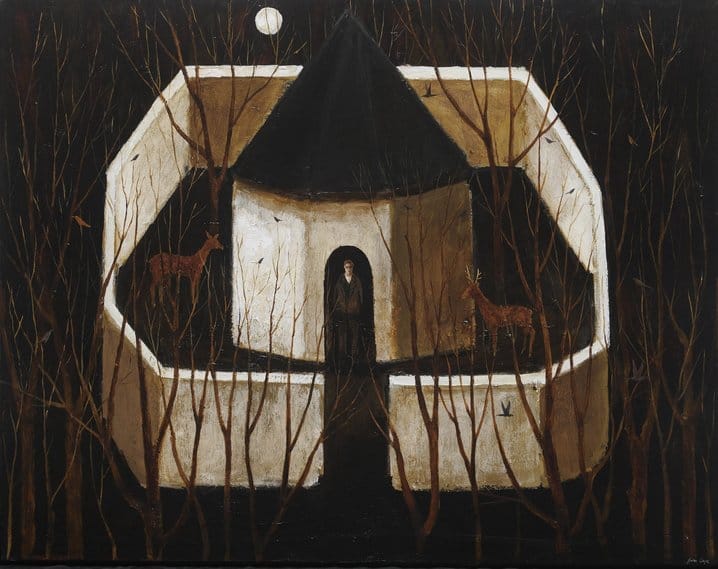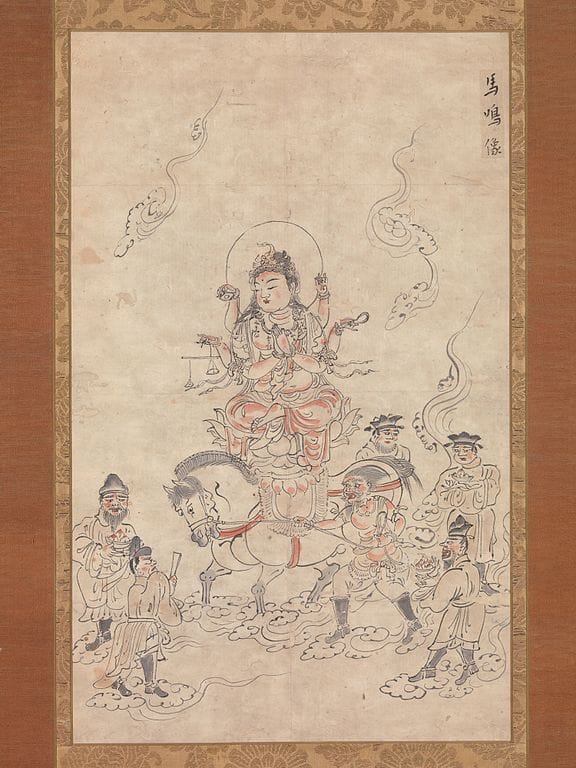Against personal salvation, or why you should go to church
We are commanded to love one another, but how can we keep this command without an other to love?

I'm back to writing regularly here at Samsara Diagnostics, but I'm trying out a once a month cadence to my publishing. Last month was just too crazy to post anything (I was totally absorbed with my book), but I've started to re-emerge from my hole this month, although I certainly have plenty of ongoing projects. Thanks for your patience, and I hope that this piece supports your practice!
The problem of individual enlightenment
I’m a Christian who thinks about Buddhism. A lot.
And one conundrum I’ve been turning over and over this past year is the nature of the bodhisattva (bo-dee-saht-vah) — in Buddhism, the bodhisattva is someone who could attain enlightenment, but has chosen to forego nirvana in order to work towards the enlightenment of other beings before they enter into nirvana.
They vow to achieve enlightenment along with every other creature in the cosmos, even if it means failing to attain their own liberation in this life.

However, I've been troubled about how some aspects of the figure of the bodhisattva seem inconsistent with the Buddha’s teachings. If desire which is precipitated by attachment to things is the root of our suffering, does not the bodhisattva fail to attain enlightenment precisely because they are still attached to the idea of others who need saving? Has the bodhisattva truly glimpsed enlightenment if they still haven't attained a non-dual vision of reality?
As I’ve tried to make sense of this puzzle in my own mind, I've arrived at an interpretation which I believe begins to lend some startling force to the paradoxical figure of the bodhisattva, the one who foregoes enlightenment for the sake of others.
If the bodhisattva turns away from their own personal enlightenment, it must be because they realize that such an enlightenment would be no enlightenment at all.
The one who turns away from individual salvation in order to commit themselves to a collective enlightenment truly understands the nature of enlightenment, for they have come to see that they cannot be liberated without every other creature also attaining that same liberation.
Personal salvation is no salvation at all. We cannot be free without others.
No short cut to salvation
This brings me to the New Testament, which makes clear in both the Gospels and the Epistles that, whatever freedom we experience through our participation in life in God, this is a collective salvation, not primarily an individual salvation.
Some recent debates in New Testament scholarship about Paul have been hitting on this question, I think. Is the mechanism of salvation which Paul describes in his epistles a personal salvation which simply impels towards community, or is God's salvation collective first and foremost and we participate in that salvation through personal inclusion in the people which God is saving for Himself?
We shouldn't miss that Jesus' message united this uneasy tension between the individual and the community. Jesus proclaims "Repent! For the kingdom of Heaven is near." The personal command to repent (change your ways) serves to prepare one to receive the gift which God is giving, but this repentance also enables one to enter into the redeemed and renewed people which God is bringing about upon the earth.
I think we can say that the personal dimension of Jesus' message is not salvation as such.
In my most recent book, I'm highly critical of one of the main characters in Shusaku Endo's novel Silence for his choice to apostatize while he nonetheless retains a secret faith in his heart. This act of nursing a private faith seems to me like an attempt to short circuit the difficult collective work of emancipation which God has undertaken in creation.
Isn't this internal and ineffable faith one of the most compelling temptations we experience today? We are constantly resisting the invitation to disappear into our own private domain of meaning-making, whether it be an online community, an insular clique, or the phantasmic world of our own imagination. From meditation to psychedelics to political activism, we are all desperately trying to save ourselves.
However, as we turn inwards to cultivate our identity (our ego-image), we begin to lose touch with the concrete reality of liberation, tricking ourselves into accepting an emaciated substitute which cannot satisfy in the long run. Instead, we have attempted to short circuit the emancipation which God holds in store for the people He is gathering together into one family from all the families of the earth.
No escape from community
As human beings, we are condemned to relationship. Community is the thing which we are all simultaneously longing for and running away from. While our relations with others can be the most effulgent sources of meaning in our lives, they also present a nearly consistent stream of pain and suffering as well. Sartre joked that hell is other people, and we can all intuitively understand his sentiment.
Christianity holds our feet to the fire on this particular point – we cannot run away from community. Paul's epistles are replete with exhortations to people to be at peace with another, to stop sowing discord, to quit spreading gossip, to stop arrogating ourselves over each other, and to instead serve one another with familial affection. We are commanded to love one another, but how can we keep this command without an other to love?
No matter how tempted we are to run away from this problem into the private realm of the imaginary, we must realize that we cannot find salvation without others. This means getting hurt on the hard edges of reality, and thus constantly having to work through our wounds together with other bitter and broken people who have the same capacity for evil which we do.
These reflections are painful, because they mean that we have to constantly engage and re-engage the problem of living in actually existent communities, instead of constantly trying to bring forth communities according to our desires and ideals. People don't like trying to live together in love and service, so they split and go start their own communities. The quest for the ideal community drives us further and further apart, rather than further into the liberation inaugurated by God on the cross.
In a twist on Sartre's claim that hell is other people, C. S. Lewis paints hell in The Great Divorce as a vast and empty wasteland in which people keep moving further and further apart so as to avoid one another, all in hopes of finding some semblance of peace. Unfortunately, wherever they go, there they are.
The only path forward is to press into the problem through a deeper and more committed engagement with the really existing communities which God puts in our lives. This does not mean uncritical acceptance of these communities, for repentance and reformation must take place at both the individual and the collective level, but we bring ourselves to this struggle with the understanding that the detours which beckon so loudly to us will, in the end, only bring us to dead ends.
I'm in the midst of another busy month as I prepare for two upcoming presentations – one near the end of the month at an online conference on Lacan (join us!) and another at a workshop at Princeton University in April. Also, I've got two podcast recordings lined up for Samsara Audio this month, both of which I'm very excited about releasing.
I've been wanting to write about the topic of this post for a while, so I'm happy to have found the time to finish these thoughts and share them with you. As always, I'd love to hear from you if you want to share any of your thoughts with me. You can use my website's Contact page, you can DM me on Twitter @notstanlee, or shoot me an email at samsara[at]skiff.com. Have a great week, and thanks for reading!
